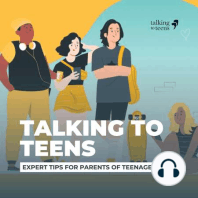24 min listen

Ep 276: Your Teen's Bullsh*t Brain
Ep 276: Your Teen's Bullsh*t Brain
ratings:
Length:
18 minutes
Released:
Jan 28, 2024
Format:
Podcast episode
Description
Lance Burdett, author of Dark Side of the Brain, explains why teens generate unhelpful thoughts and how we can reframe anxious thinking by getting comfortable with discomfort.If you've enjoyed Talking to Teens, we'd love if you could leave us a five-star rating, and if you have time, a review! Full Show NotesRaising teenagers can feel like navigating an emotional minefield blindfolded. Their moods swing rapidly from joyful to gloomy, their friendships feel fleeting, and their interests change every five minutes. Meanwhile, the pressure to get good grades, gain college acceptance and determine their entire future weighs heavily on their shoulders.It’s no wonder teens get overwhelmed by this cocktail of hormones, peer pressure and looming adulthood. Their brains are firing on all cylinders, trying desperately to make sense of it all. Often, this neural chaos manifests as worry, anxiety, negative thought patterns and even depression.So how can we help teens move through this rocky passage of life? How can we get them to open up about their mental struggles instead of shutting down? Most importantly, how can we empower them to reframe unhelpful thoughts and take control of their own wellbeing?To gain some perspective, we’re speaking with Lance Burdett, a former police crisis negotiator turned adolescent mental health expert. Lance has worked extensively with teens and parents to help them understand the “Dark Side of the Brain” – the automatic negative thought patterns that often arise during times of stress.In his book Dark Side of the Brain and on today’s episode, Lance is explaining the science behind our brain’s threat detection system that generates needless worry. He’s also revealing why it’s okay for teens to admit they’re not okay – as long as they ask for help afterward. We discuss how parents can model self-care, help teens reframe anxious thoughts and teach kids to get comfortable with discomfort.Why Our Brains Make Sh*t UpThe human brain developed mainly to keep our ancestors alive on the African savanna over two million years ago. This means our brains are wired first and foremost for survival, not happiness, Lance explains.When our ancestors encountered threats like predators, adverse weather or lack of resources, their brains kicked into high alert, pumping out adrenaline and cortisol to ready the body for fight or flight. Unfortunately, our modern brains can’t tell the difference between a lion attack and a mean comment on Instagram. So teens often experience an exaggerated stress response to non-life-threatening issues like peer drama or academic pressure.This is why teens frequently catastrophize small problems, assume the worst and spiral into intense worry, Lance says. Their brains are simply acting on evolutionary impulses that once kept humans safe – but now cause needless stress. Understanding the brain’s tendency to “make shit up” can help teens reframe anxious thoughts as just their brains being overprotective.It’s Okay to Say “I’m Not Okay”Parents often tell struggling teens that “it’s okay not to be okay” to encourage them to open up about their troubles. But Lance warns that this mantra can be dangerous if left by itself, as it makes mental distress seem permissible. Instead, he advocates adding a second half – “it’s okay to say I’m not okay...as long as I ask for help afterward.”The most vital step for teens is the help-asking, Lance stresses. Admitting one is not okay is only the first move. What matters next is having teens reach out to friends, family members, counselors or crisis lines to get the support they need.Lance explains that previous generations hid mental health struggles due to stigma. But today’s teens can be more open about feeling depressed, anxious, overwhelmed or suicidal – on the condition that they let caring adults know they need support. Saying “I’m not okay” is the starting point, not the solution itself.Running Towards DiscomfortAs parents, we often try to smooth out every bum
Released:
Jan 28, 2024
Format:
Podcast episode
Titles in the series (100)
Ep 6: Don't Raise a Wimpy Teen: Nick Boothman, New York Times bestselling author of "How to Make People Like You in 90 Seconds or Less" reveals how to instill perseverance in a teenager. He has raised five highly successful children and he worked hard to teach his kids to be resourceful by Talking To Teens: Expert Tips for Parenting Teenagers